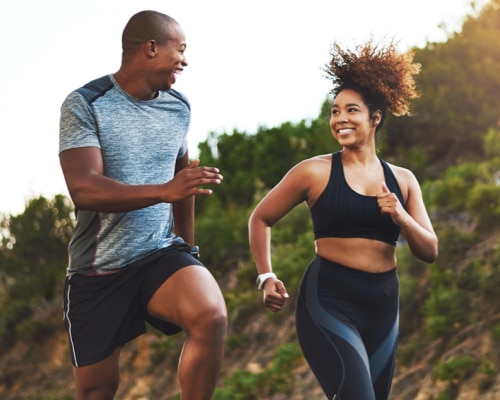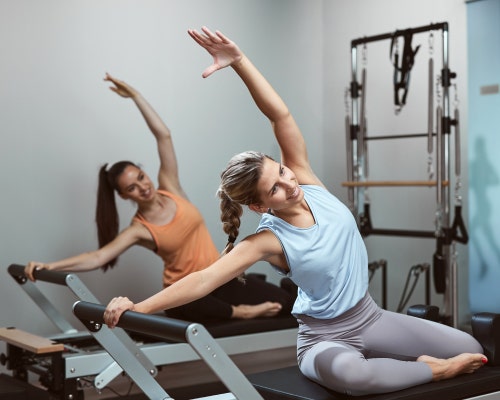

The hottest new fitness trend is all about getting ice cold. Taking a plunge into ice-cold water has surprising health benefits to help you recover faster from a workout.
Cold plunging might be making a splash on the fitness scene, but cold exposure treatments like ice baths have been around since the time of the Ancient Greeks, who reportedly used ice baths as a form of relaxation. Hippocrates, the father of medicine, used ice baths for medicinal purposes.
But before you jump in, let’s explore the science behind the cold plunge trend.
What is a Cold Plunge?
Doing a cold plunge, or cold water immersion, is putting your body into cold water as a means of cold exposure. A cold plunge can be done in a variety of settings such as ice baths, cooled tanks, and even cold streams or other natural bodies of water.
The intent of a cold plunge is to expose the body to colder-than-normal temperatures. Though cold plunging is commonly used in rehabilitation and sports performance settings, there currently aren’t “best practice” standards for ideal water temperature or cold exposure duration.
What about cold showers? Do they count as a cold exposure? Technically, yes, cold showers can be a form of cold exposure. However, in a shower, not all the muscles are exposed at the same time as with an ice bath.
Cold Plunge Safety
All it takes is dipping one toe into a cold body of water to appreciate the shocking effects that cold water can have on the body.
The National Center for Cold Water Safety warns that cold water (50-60°F) exposure can cause you to hyperventilate, enter a state of shock, and experience hypothermia and the shutdown of your muscle function quickly.
Taking an initially conservative approach to cold plunging, with short exposures to water at a higher temperature, can help you acclimate to the cold temperatures.
Be sure to speak with your medical provider before doing a cold plunge, particularly if you have a history of heart or lung disease, seizure disorder, or diabetes.
Science Behind the Cold Plunge Trend
Let’s explore the metabolic and performance benefits to be gained from cold exposure.
Immune Health
Despite what we may have heard about playing outside in cold water, it seems that cold water exposure can result in increased markers of immune health. Adding cold plunge to your recovery routine may help reduce inflammatory markers, which play a role in immune health and protection against infection.
Muscle Recovery
It might be time to add a cold plunge to your post-workout stretching and muscle recovery routine. The most well-studied benefit of cold plunge is for reducing muscle soreness after a workout.
One recent review suggested that temperatures between 50-59°F for 10 to 15 minutes are optimal for reducing muscle soreness. However, there is significant variation in the proper temperature and duration of a cold plunge to experience benefits from person to person.
One older study on college athletes found that cold water immersion did help with muscle soreness, but it wasn’t significantly better than an active recovery routine. The authors proposed that cold plunge and active recovery could be used together to improve recovery and reduce muscle soreness.
Hot Tip: Keep Sport Organic Recovery in Blackberry Lemonade on hand for muscle recovery support after your daily workout.
Stress Management
The cold plunge may help build resilience against stress from the fact that we simply don’t want to get into cold water. In other words, doing something that you don’t want to do because it is stressful helps you learn how to handle stress.
Stress scientists use a cold water challenge where participants put one hand into cold water to activate major stress pathways in the brain. Imagine how much immersing your body activates the same stress pathway!
What the cold water challenge research tells us is that overcoming the fear of cold water and being able to mentally adapt when part of your body is in cold water strengthens mental resilience.
Additionally, hormones associated with stress, such as cortisol, are lower after cold exposure. One small study of older adults who participate in winter sea bathing reported lower levels of stress and enhanced well-being.
Mental Focus
One of the neurotransmitters released during cold exposure is norepinephrine, which is associated with focus and attention. Some of what is known about cold plunging and mental focus is from self-reported data and there is more to be learned about the brain benefits of ice baths.
If you’re ready to add a cold plunge to your fitness routine, remember to start slow and know that each icy plunge builds your mental and physical resilience.
References
-
Allan R, Malone J, Alexander J, et al. Cold for centuries: a brief history of cryotherapies to improve health, injury and post-exercise recovery. Eur J Appl Physiol. 2022;122(5):1153-1162. doi:10.1007/s00421-022-04915-5.
-
Machado, A, Ferreira, P, Micheletti, J et al. Can Water Temperature and Immersion Time Influence the Effect of Cold Water Immersion on Muscle Soreness? A Systematic Review and Meta-Analysis. Sports Med. 206;46:503–514. doi:10.1007/s40279-015-0431-7.
-
National Center for Cold Water Safety. Accessed August 11, 2023. https://www.coldwatersafety.org/the-danger.
-
Esperland D, de Weerd L, Mercer J. Health effects of voluntary exposure to cold water - a continuing subject of debate. Int J Circumpolar Health. 2022;81(1):2111789. doi:10.1080/22423982.2022.2111789.
-
Getto C, Golden G. Comparison of active recovery in water and cold-water immersion after exhaustive exercise. Athl Train Sport Heal Care. 2013;5(4):169–76. doi:10.3928/19425864-20130702-03.
-
Schwabe, L, Schächinger, H. Ten years of research with the Socially Evaluated Cold Pressor Test: Data from the past and guidelines for the future. Psychoneuroendocrinology. 2018;92:155-161. doi: 10.1016/j.psyneuen.2018.03.010.
-
Demori, I, Piccinno, T, Saverino, D, Luzzo, E, et al. Effects of winter sea bathing on psychoneuroendocrineimmunological parameters. Explore. 2021;17(2):122-126. doi:10.1016/j.explore.2020.02.004.






